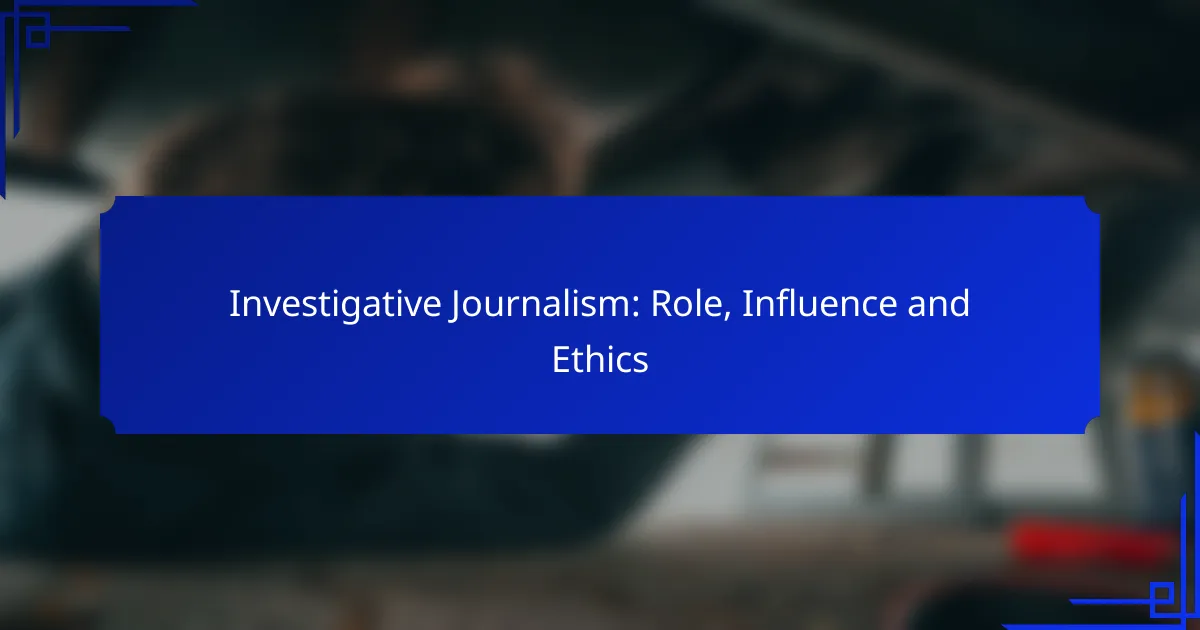Investigative journalism plays a vital role in shaping public opinion by revealing hidden truths and fostering informed discourse. Through thorough research and analysis, investigative journalists hold power accountable and bring significant issues to light, often driving social change and policy reform. However, this important work is accompanied by ethical considerations, including the need for objectivity and the careful balancing of the public’s right to know with individual privacy rights.
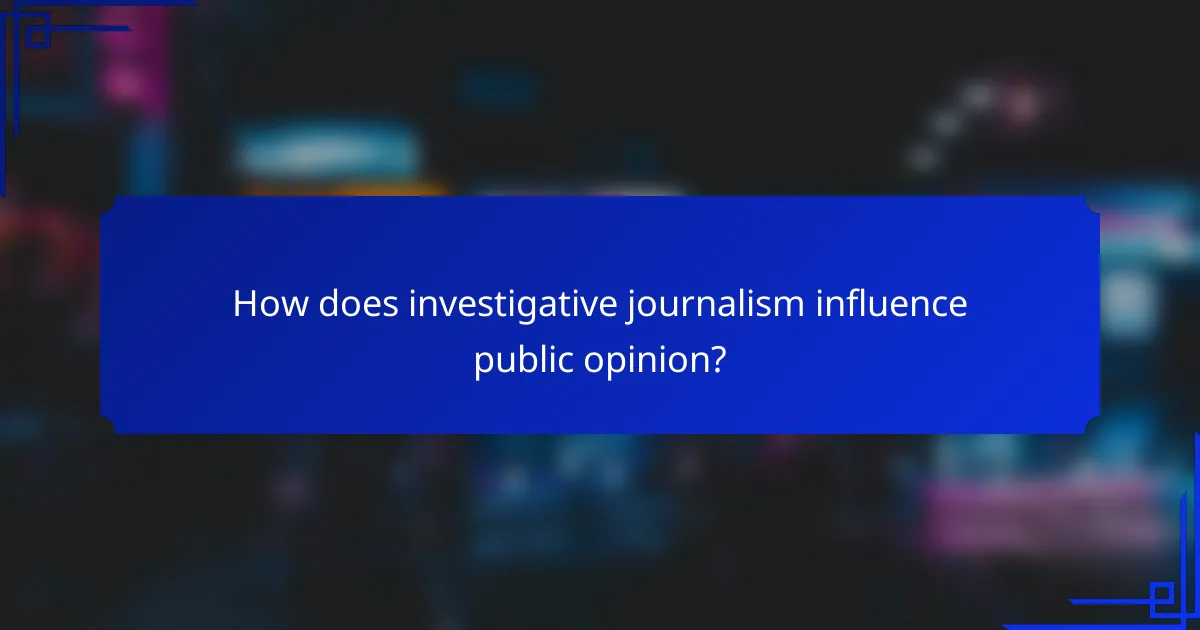
How does investigative journalism influence public opinion?
Investigative journalism significantly shapes public opinion by uncovering hidden truths and presenting them in a compelling narrative. This type of journalism informs citizens, encourages discourse, and can lead to social change by highlighting issues that matter to the community.
Shaping narratives through in-depth reporting
In-depth reporting allows journalists to explore complex issues thoroughly, providing context and background that shape public understanding. By presenting detailed investigations, journalists can frame narratives that resonate with audiences, influencing how they perceive events and issues.
For example, a comprehensive report on local environmental pollution can lead to heightened awareness and concern among residents, prompting them to advocate for policy changes. This narrative-building is crucial in guiding public discourse and opinion.
Exposing corruption and holding power accountable
Investigative journalism plays a vital role in exposing corruption and holding those in power accountable. By uncovering unethical practices, journalists can bring transparency to government and corporate actions, fostering trust in institutions.
For instance, investigations into financial misconduct or political scandals often lead to public outrage and calls for reform. This accountability not only influences public opinion but can also result in legal consequences for those involved, demonstrating the power of journalism in a democratic society.
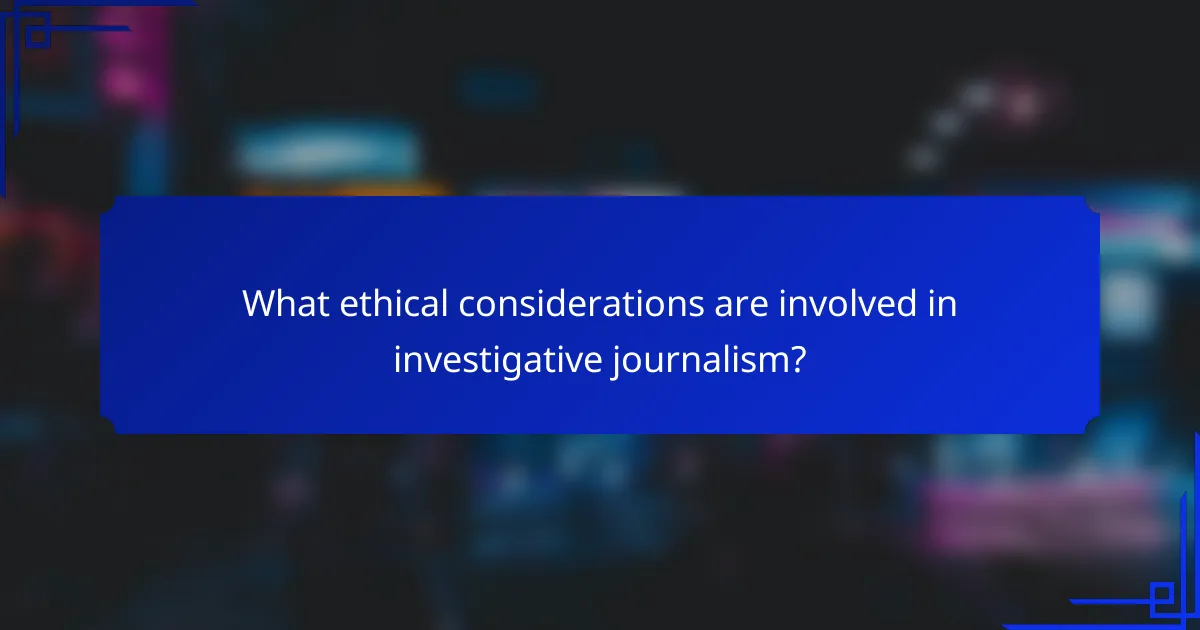
What ethical considerations are involved in investigative journalism?
Investigative journalism involves several ethical considerations that are crucial for maintaining credibility and trust. Key issues include ensuring objectivity, respecting privacy rights, and balancing the public’s right to know with the potential harm to individuals.
Maintaining objectivity and impartiality
Objectivity and impartiality are fundamental to investigative journalism. Journalists must strive to present facts without bias, ensuring that all sides of a story are represented fairly. This can involve rigorous fact-checking and seeking multiple sources to corroborate information.
To maintain objectivity, journalists should avoid personal opinions and emotional language. They can use techniques such as the inverted pyramid style, where the most critical information is presented first, allowing readers to form their own opinions based on the facts provided.
Balancing public interest with privacy rights
Balancing the public’s right to know with individuals’ privacy rights is a significant ethical challenge in investigative journalism. While exposing wrongdoing is essential, journalists must consider the potential impact on individuals’ lives, especially when reporting on sensitive issues.
Journalists should assess whether the information serves a genuine public interest or if it merely satisfies curiosity. When in doubt, they can apply the “public interest test,” weighing the benefits of disclosure against the potential harm to individuals involved. This approach helps ensure that the pursuit of truth does not infringe upon personal privacy unnecessarily.
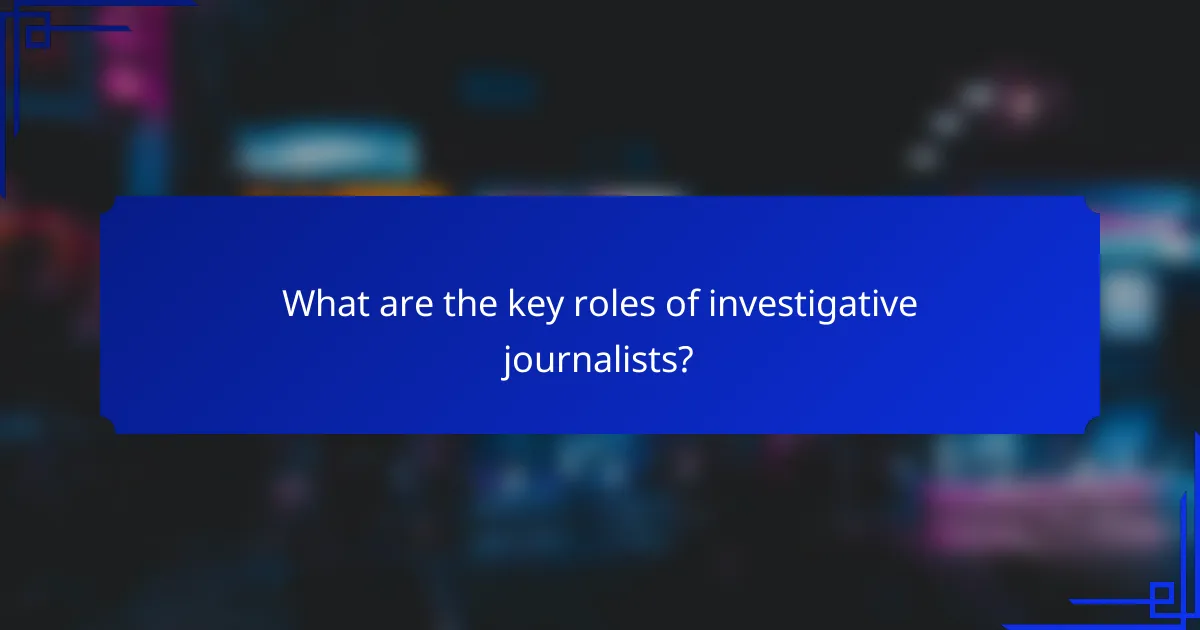
What are the key roles of investigative journalists?
Investigative journalists play a crucial role in uncovering hidden truths, holding power accountable, and informing the public about significant issues. Their work often involves in-depth research, analysis, and the presentation of findings that can lead to social change or policy reform.
Conducting thorough research and fact-checking
Investigative journalists must conduct extensive research and rigorous fact-checking to ensure the accuracy of their reports. This process often involves reviewing documents, interviewing experts, and cross-referencing multiple sources to build a solid foundation for their stories.
Effective research techniques include using public records, databases, and online resources. Journalists should be familiar with local laws regarding access to information, as these can vary significantly by country. For example, in the United States, the Freedom of Information Act (FOIA) allows journalists to request access to federal agency records.
Building trust with sources and communities
Establishing trust with sources and communities is essential for investigative journalists. Trust encourages sources to share sensitive information and can lead to more in-depth insights into complex issues. Journalists should prioritize transparency and ethical practices to foster these relationships.
To build trust, journalists should maintain confidentiality, communicate openly, and show respect for the communities they cover. Engaging with local organizations and attending community events can also help journalists connect with potential sources and understand the context of the issues they investigate.
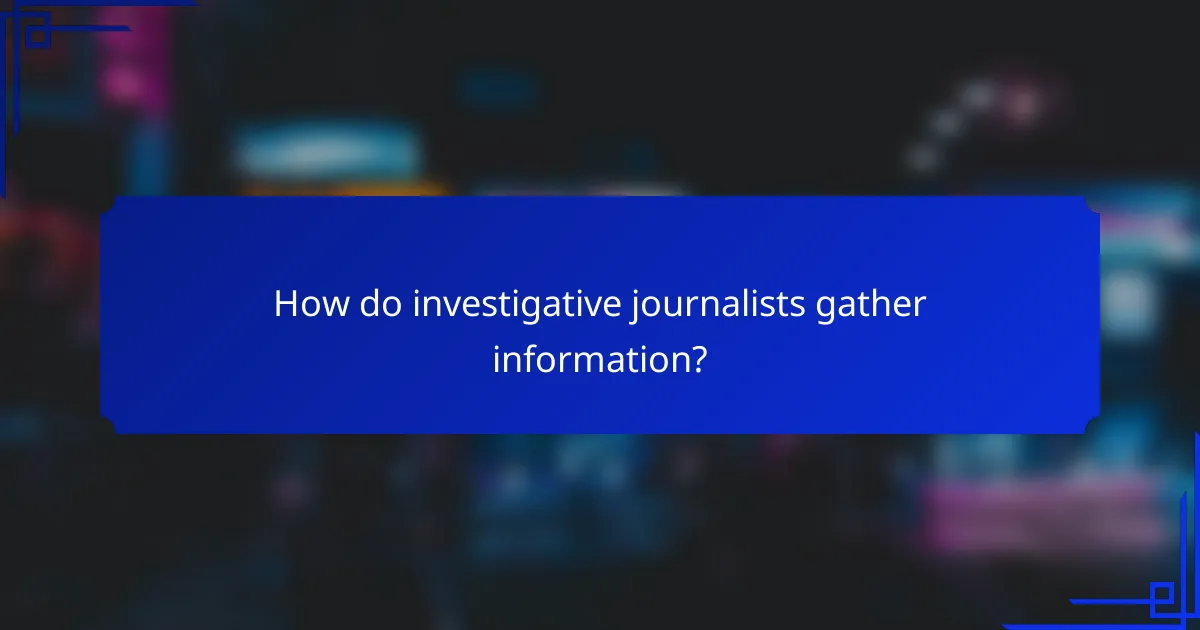
How do investigative journalists gather information?
Investigative journalists gather information through a combination of public records, interviews, and sometimes undercover methods. These techniques help uncover truths that may be hidden from the public eye and hold powerful entities accountable.
Utilizing public records and data analysis
Public records, such as court documents, government reports, and financial statements, are vital resources for investigative journalists. By analyzing these documents, journalists can identify patterns, discrepancies, and potential wrongdoing.
Data analysis tools can help journalists sift through large datasets to find relevant information. For instance, using software to analyze financial transactions can reveal unusual spending patterns that warrant further investigation.
Common pitfalls include overlooking less obvious records or failing to verify the accuracy of the data. Journalists should cross-reference information from multiple sources to ensure reliability.
Conducting interviews and undercover investigations
Interviews are a cornerstone of investigative journalism, allowing reporters to gather firsthand accounts and insights. Building rapport with sources can lead to more candid conversations and valuable information.
Undercover investigations involve journalists posing as someone else to gather information discreetly. While this method can yield significant insights, it raises ethical concerns and should be approached with caution.
When conducting interviews, journalists should prepare open-ended questions and be ready to adapt based on the conversation. For undercover work, it’s crucial to understand the legal implications and ensure that the investigation adheres to ethical standards.
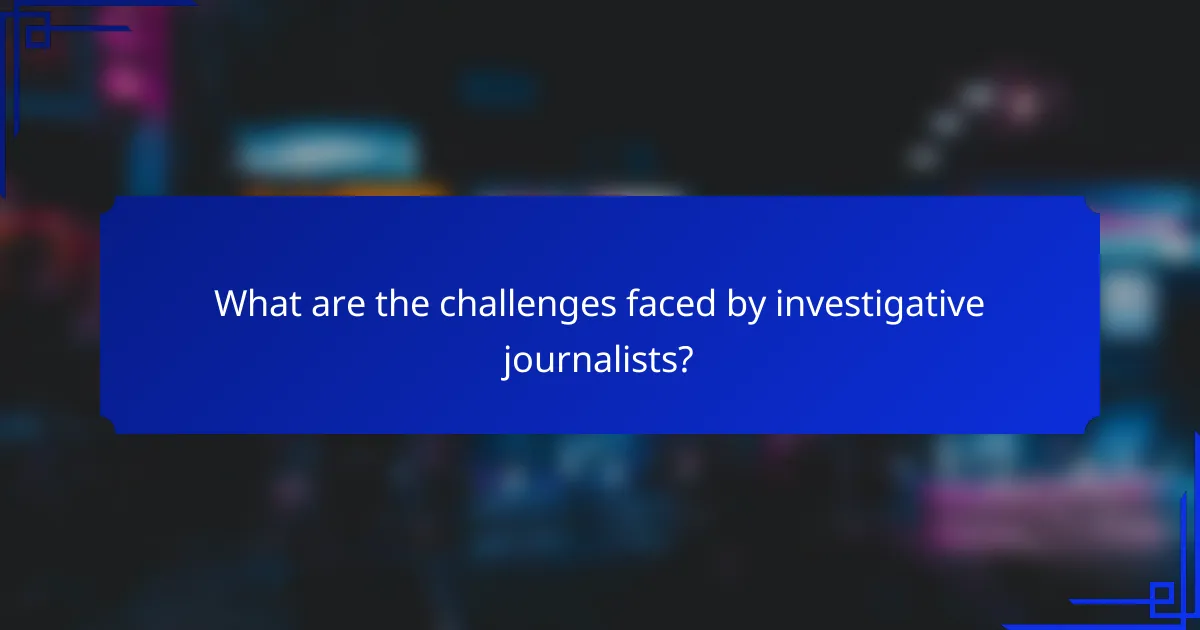
What are the challenges faced by investigative journalists?
Investigative journalists encounter numerous challenges that can hinder their work, including legal threats, censorship, and limited funding. These obstacles can significantly impact their ability to uncover and report on critical issues affecting society.
Legal threats and censorship
Legal threats and censorship are significant challenges for investigative journalists. They often face lawsuits, harassment, or even criminal charges aimed at silencing their reporting. For instance, journalists in some countries may be prosecuted under vague laws that restrict freedom of expression.
To navigate these risks, journalists should familiarize themselves with local laws regarding press freedom and seek legal counsel when necessary. Building a network of supportive organizations can also provide resources and protection against potential legal actions.
Funding and resource limitations
Funding and resource limitations pose another major challenge for investigative journalism. Many news organizations have cut back on investigative reporting due to budget constraints, leading to fewer resources available for in-depth stories. This can result in a reliance on grants or crowdfunding to support investigative projects.
Journalists can mitigate these limitations by collaborating with nonprofit organizations or partnering with other media outlets to share resources. Additionally, focusing on local stories that resonate with community interests can attract funding from local sponsors or grants aimed at supporting journalism.
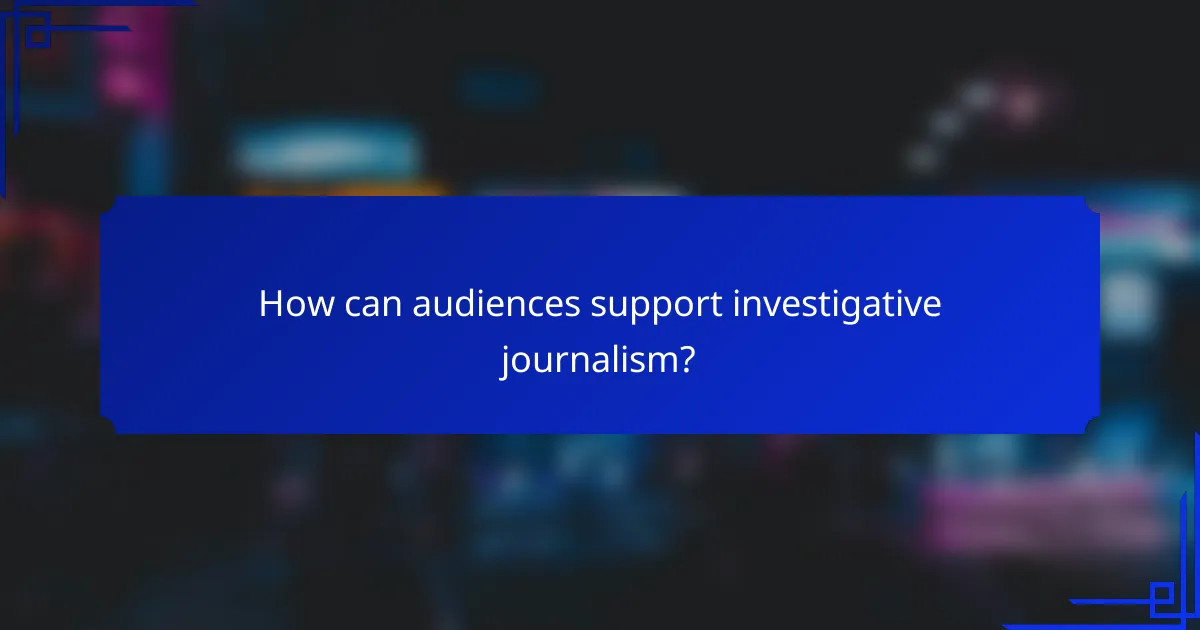
How can audiences support investigative journalism?
Audiences can support investigative journalism by actively engaging with and funding independent news organizations. This involvement not only ensures the sustainability of quality journalism but also fosters a more informed public.
Subscribing to independent news organizations
Subscribing to independent news organizations is a direct way to support investigative journalism. Many of these outlets rely on subscription fees to fund their reporting, which often covers critical issues that mainstream media may overlook.
Consider choosing a subscription model that aligns with your budget. Monthly subscriptions can range from around $5 to $20, depending on the organization. Look for outlets that prioritize investigative work and have a track record of impactful reporting.
Participating in crowdfunding initiatives
Participating in crowdfunding initiatives is another effective method to support investigative journalism. Many journalists and small news organizations turn to platforms like Kickstarter or GoFundMe to raise funds for specific projects or ongoing investigations.
When considering crowdfunding, assess the project’s goals and the credibility of the journalists involved. Contributions can vary widely, from small donations of $10 to larger amounts that may offer perks like exclusive content or behind-the-scenes access. Engaging in these initiatives not only provides financial support but also helps amplify important stories that need to be told.
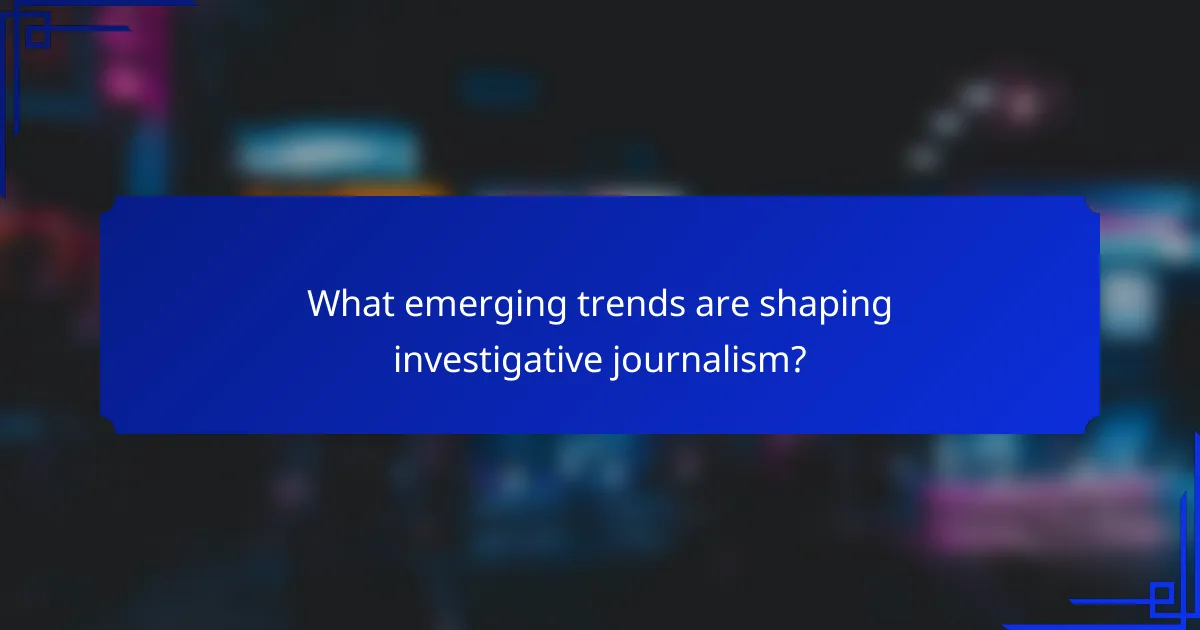
What emerging trends are shaping investigative journalism?
Emerging trends in investigative journalism are significantly influenced by advancements in technology and evolving audience expectations. These trends include the integration of data journalism and the use of digital tools to enhance reporting accuracy and depth.
Increased use of technology and data journalism
The rise of technology has transformed investigative journalism, enabling reporters to analyze vast datasets and uncover hidden stories. Tools like data visualization software and social media analytics allow journalists to present complex information in an accessible manner.
Data journalism involves using statistical methods to investigate and report on issues, making it essential for uncovering trends and patterns. For example, journalists can use public records and databases to track government spending or analyze crime statistics, providing a clearer picture of societal issues.
However, reliance on technology can pose challenges, such as ensuring data accuracy and maintaining ethical standards. Journalists should verify sources and be cautious of potential biases in data interpretation to uphold the integrity of their investigations.
